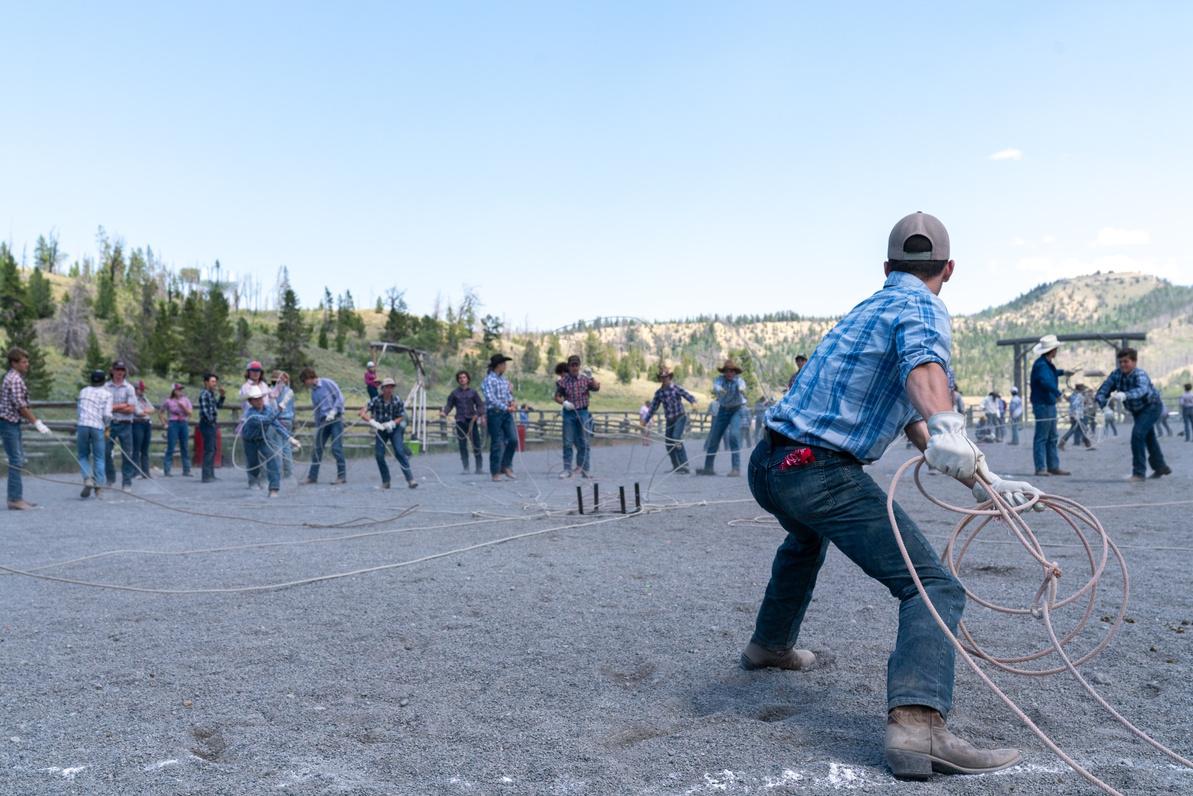
22 minute read
TVRC: From Here to Anywhere
It is often said that there is magic in the way TVRC draws the right people in summer after summer to create a community that is founded on the pursuit of adventure and dogged in developing the potential each individual brings with them to the Ranch packed inside plaid shirts and dusty boots. In the early years, staff members like Jack Davis and Paul Petzold joined in Weenie's dream and while they were already knowledgeable and skilled in their own right before TVRC, they and many others left TVRC with the mark of experience and wisdom that the Ranch leaves on its people after summers spent in the valley. Both of these men left TVRC and ended up becoming legends in their own right from Jack's work at Triangle X and Paul's work in pioneering American mountaineering and founding NOLS.
And the tradition doesn't stop there. There is a sign that hangs on the Crow's Nest in our Rodeo Arena that says "Caution future world and local leaders at play," and that sentiment rings true as those lucky enough to join the ranks of Yearlings, Rough Riders, Top Hands, Wranglers, and Trailblazers leave TVRC with grit, empathy, and skills to shape their communities and lives into the thing Weenie Wilson dreamed of when he decided that kids needed a place like TVRC. In fact, many of our alumni have gone on to make significant contributions in their chosen fields. From outdoor educators to entrepreneurs, western riding professionals, environmental activists, photographers, and whatever one could dream of to put their mind to work.
In this edition of the Wrangler, we will be introducing you to 5 such alumni who have taken talents that they learned or cultivated at TVRC into their professional lives and have become leaders in their own fields.
Bubba Albrecht, Give'r Founder
How old were you when you came to TVRC?
When I first came to camp I was 10 and I turned 11 in August that summer. My mind was blown. I love Ohio, but was lucky to be, as a Yearling, granted permission to do things a little different and go on a ton of trips with Top Hands and Rough Riders.
Talk about your time at camp: what were your favorite parts?
I think it was the options– I had the choice to try different things. And it mostly came down to the trips and the connections made with different campers and staff members on those trips. Flexibility to get out and do it like when I went to Holly Lake as a Yearling and camped on snow and got to learn what glissading was all about from older folks.
What did you learn when you came back as a staff member?
It's the ability to learn as a young camper from older campers– the same dynamic applied to being a staff member. Jumping into the mix and saying there's a lot that I don't know, but there are a ton of people who do, so getting to learn from those who had been doing it for a long time. Over 9 years on staff as a Trip Leader and Counselor, and then running the Trips Program and In-Camp Program, I learned the importance of asking the right questions and taking it one step at a time. I was into trips so I said, "Whenever you need someone for a trip, I would love to go on it and be a Trip Leader".
What are some life lessons you learned at TVRC?
I describe it to folks as like the type 2 fun, when you are getting snowed on or you are soaking wet or you get a curveball to the original plan– those were often the most memorable experiences whether as a camper or staff member. The backcountry is the best classroom there is, and I learned about the resilience of a team and a group to come together both out there and at camp.
How have these lessons shaped your life beyond the Ranch?
Everything I learned at TVRC from the appreciation and love for the outdoors to trips with friends, peers, and kids set the tone for what eventually became Give'r.
What led you to found Give'r?
Give'r is Canadian slang and translates roughly to “Give it your all; go for it; get after it”. It is not surprising that the Venn diagram of TVRC is– Ready to Ride, Grit, and Resilience– those are all in the same family of words. If you are going to do something, do it with everything you got. And it's not surprising to me that I connected with this term in Canada even when I was younger. The Give'r brand exists to encourage, support, and inspire that mentality which is whether it is riding for the first time or fly fishing or barrel racing or team roping– you leave it all on the field, all in the arena, and give it everything you’ve got and that's how you grow.
What advice would you give to a camper at TVRC today who finds that same spark of passion you did?
You are not abnormal for not knowing exactly what the path is. That tension and uneasiness of not knowing is a good place to be in. Whatever you do– do it with everything you've got. So, if you are going to clean the Dining Hall, clean it to the best of your ability. The things you learn by doing will inform you and apply to school, friends, family– all the good stuff. Observe the conditions and use the information and tools you have to solve the problem you are facing in the safest way possible. Risk management is not about one bad decision– it is a lot of bad decisions that build up. Go slow and steady when there are the highest stakes.
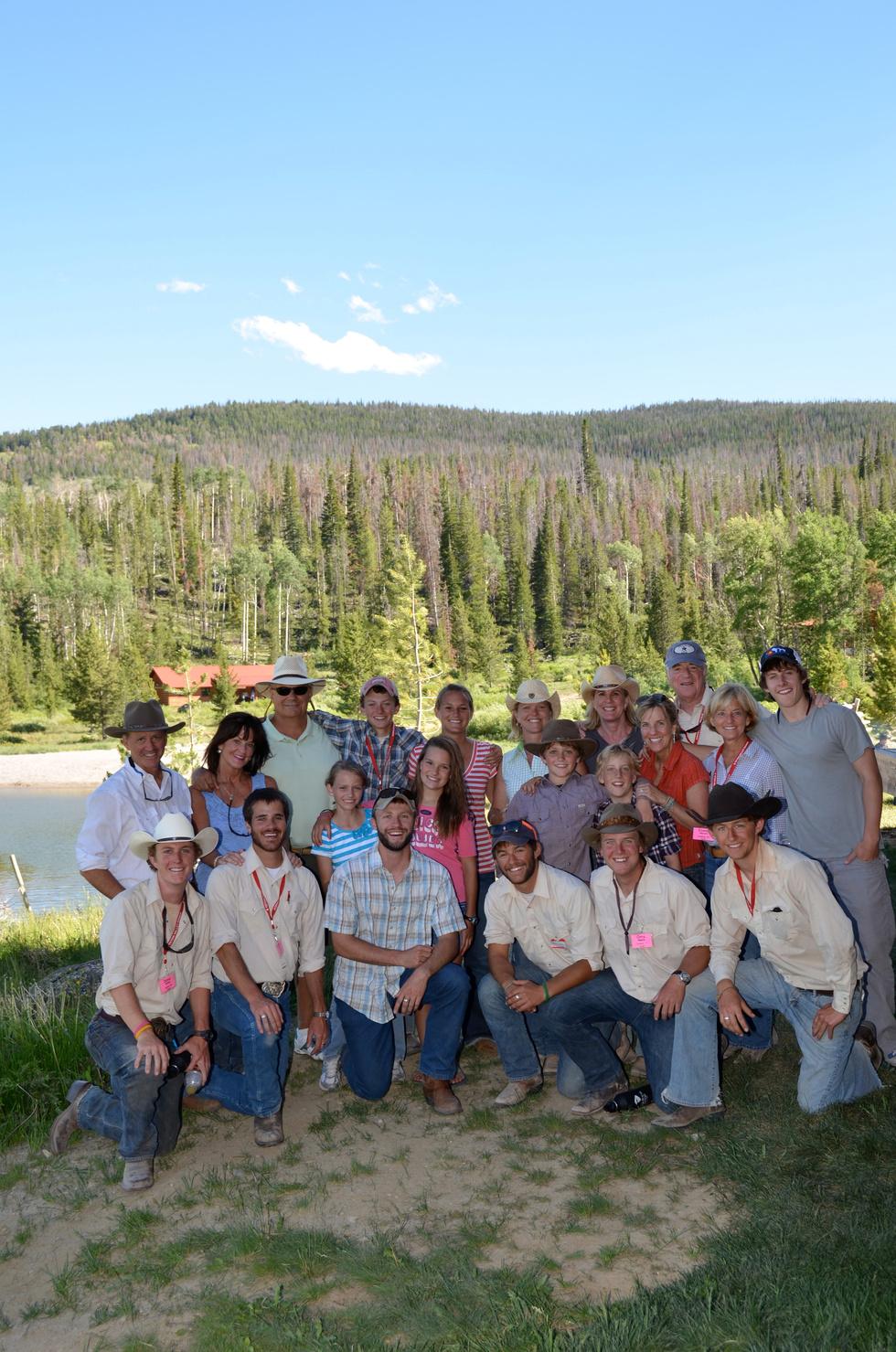
Molly Peterson Barnes, High Mountain Institute Co-founder
How old were you when you came to TVRC?
I was 14, and I was an older Rough Rider.
Talk about your time at camp: what were your favorite parts?
My favorite was the roping competitions. I was not as interested or as good at the riding events but roping was so much fun and fun to practice. I won the archery and riflery as a Rough Rider, too, and it was just because I showed up a lot which is kind of funny. The Rough Rider Adventure sheet had so many things you had to try to do to go on the ride. I loved that at the time and as an educator still love that idea. Dip your toe in– if you don’t like it you don’t have to go back, and I never would have gotten into many of those things if not for the sheet.
On staff I was a Top Hand Counselor, and I put emphasis on the girls that wanted to specialize in hiking. It was one of my first paid positions leading other people on hikes. As an educator, I really enjoy those moments where you can get someone to see that they are stronger than they thought they were and they can do more than they thought they could. Helping people find their strength is one of my passions and I experienced that for the first time in a hiking capacity at TVRC.
You went on to co-found HMI– what elements of your TVRC experience, if any, influenced your path to opening HMI?
I think that Christopher (my co-founder) and I were both leading extended wilderness expeditions and also working in traditional classroom settings and we wanted to combine those two passions. Our school year experiences didn’t have the community connection to the outdoors and our summer work didn't have the intellectual component we were looking for. TVRC was my first foray into outdoor work as an educator. TVRC was and still is a really important place in my life; in fact, my dad used to joke that he regretted sending me to camp because he lost my heart to the western mountains. TVRC made me want to do more than just 5 weeks of camp and that is why I ended up working for Deer Hill Expeditions and NOLS and eventually co-founding HMI.
Why Outdoor Education?
The thing I feel most passionate about is helping people develop their own connections to the natural world. I still work part-time for NOLS and when I’m asked why I do that, my answer is that it is because my investment in a Wilderness First Aid course for a few days can lead to meeting my personal mission. I want people to have connections to the open spaces because people cherish and protect what they have connections to.
What are some life lessons you learned at TVRC?
How important a midday nap is. It is a little bit about caring for yourself so that you can continue to fully engage. Coming together as a community through rituals like campfire where you have shared experiences with people around you and the importance of those is another thing I learned. And it doesn’t really matter what they are– it was the shared experience and the ritual of “this is what we do” that mattered. I really appreciate ritual and pattern in the sense that you can’t always force quality but creating space for it allows it to emerge.
How have these lessons shaped your life beyond the Ranch?
It is completely my life. I have completely embraced outdoor education and education in every context. It’s not fair to my parents and family to give all the credit to TVRC because we were fairly active and outside as a family, but camp was certainly a formative moment. Those weeks at TVRC were hugely important in getting me on the trajectory that I followed in my career.
What advice would you give to a camper at TVRC today who finds that same spark of passion you did?
Nothing worthwhile is ever fast or easy. Incremental forward progress is what gets you there. The lesson you learn from a TVRC hike is if you keep walking, you get to that beautiful place, but if you stop just because it is hard, you won’t get there. The side of the mountain is just as important as the top itself because without the journey it is just a pretty view.
Anything else you would like to share?
We haven’t talked at all about the fun. Camp is just so much fun and a truly joyful place. I remember the incredible joy I felt and in a way, that is ultimately what my end goal is– finding the joy in everything. Finally, TVRC gave me life-long friendships, including the woman who would ultimately be the maid of honor at our wedding.
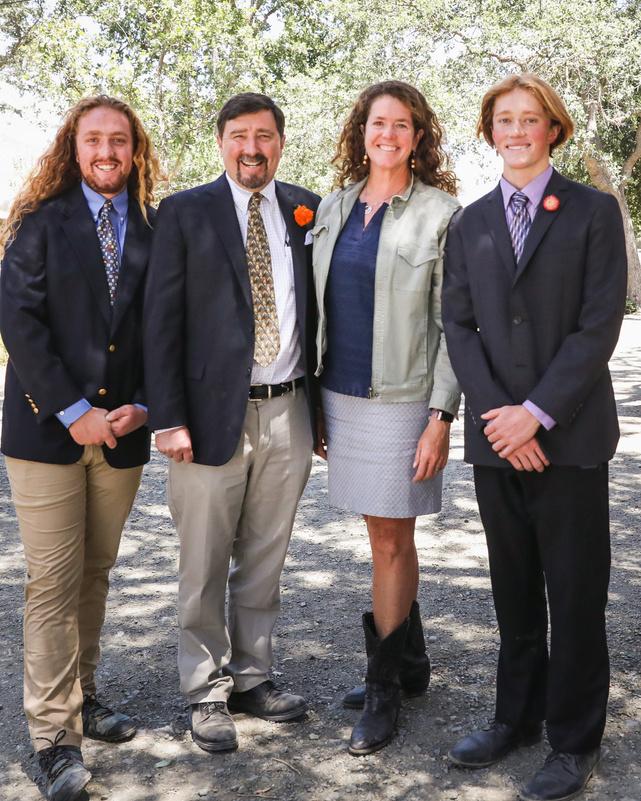
Lisa Pike Sheehy, Senior Environmental and Philanthropic Advisor at Patagonia
How old were you when you came to TVRC?
I was 13, and came after my 8th grade school year. I did three summers in a row– Rough Rider, skipped Top Hand and then was a Wrangler and Trailblazer. My mother and aunt also attended, I was a counselor for one summer right after college, and then served on the TVRC board for several years.
Talk about your time at camp: what were your favorite parts?
I enjoyed the day to day rhythm of being in camp. How each day was unique anchored by the campfires every evening and turning to face the river to sing Peace. And I loved the creativity that came out every night in the skits and plays. Being out of camp was also a major highlight. I loved any and all of the opportunities that we got to go into the backcountry, and I particularly loved the Pack Trips. I always ended up at Crystal Creek. Hiking Static Peak as a Wrangler and signaling camp was another pinnacle moment for me.
What are some life lessons you learned at TVRC?
I think a story would be great here and there were many, but I definitely know I left with these values deeply instilled: resiliency, camaraderie, and the spirit of Fun. I’ve drawn on them all at different points of my life. Resiliency is hugely important as you navigate through life's ups and downs. Camp taught me a lot about camaraderie, coming together as a group, and the spirit of fun working through a challenge.
How have these lessons shaped your life beyond the Ranch?
You never know what is ahead. Life is full of surprises, both personally and professionally, and dealing with these challenges with courage, ingenuity, and determination are things that come from my time at camp.
What about TVRC made you fall in love with the wilderness?
Because I grew up back East, I had never experienced wild open spaces like I did in Wyoming. Getting into the backcountry was really a life changing experience for me. I fell in love with the magnitude and the wildness of it all.
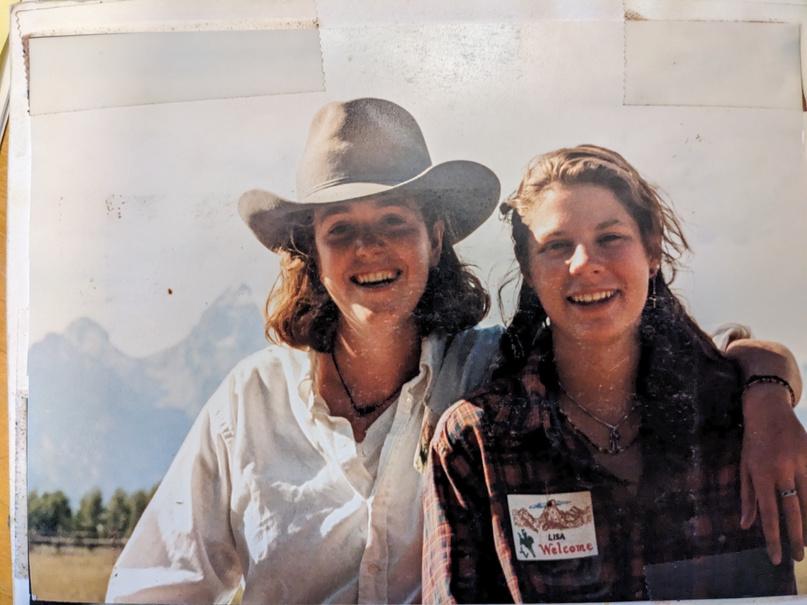
What are your favorite wild places that you traveled to with TVRC?
My favorite day trips were Amphitheater Lake and Lake of the Crags. I love the 10-mile days to get to beautiful lakes, jumping off the rocks at places like Phelps Lake, and being up in the Gros Ventre on Crystal Creek.
Can you talk about memories from being on trail– what did you love?
I remember in addition to the talking, joking, and storytelling that I also treasured the quiet while hiking or riding to think and reflect. There is a lot of time spent getting to your destination and it provides this beautiful space in your mind to wrestle with thoughts and ideas. I also loved making up songs to sing back at camp from the trip. In the evening on trips, I fondly remember counselors reading The Spell of the Tetons out loud to us, which was a reworked version of The Spell of the Yukon by Robert Service, before turning in for the night.
How has your experience at TVRC inspired your current work?
I returned to Jackson Hole after college to work as a counselor at TVRC and then to work at what was at the time, the only conservation organization in Jackson, the Jackson Hole Conservation Alliance. I wanted to give back to the place that had given me so much.
Since then, I have worked for other environmental nonprofits all the way up to my current role at Patagonia working to save our home planet. A thread through it all - has been my desire to give back to places that have inspired me and to protect them for future generations.
What advice would you give to a camper at TVRC today who finds that same spark of passion you did?
Just keep looking for opportunities in your life that align with your values and passions. Work for mission driven organizations. Find those enduring places that you can draw inspiration from like your experience at TVRC, and surround yourself with people who inspire you to not just go fast but go far.
Greg Von Doersten, Author/Photographer/Filmmaker/Artist
When did you first come to TVRC?
I was at TVRC in the early 70s as a young kid enjoying the Rough Rider, Top-Hand and Wrangler programs .
Talk about your time at camp: what were your favorite parts?
I was always into outdoor experiences even before TVRC. I went to a sailing and canoeing camp in Maine, but TVRC was another level of exploring more skill sets that I did not have which were horsemanship, horse packing, backpacking, climbing and giving me what I think was my initial foundation of my outdoor skills. I ended up going onto NOLS. In college, I was a recreation management major. Camp gave me the confidence and skill set that I needed at an early age that I kept developing to just go for it and to pursue my craft in photography. For me it was that nucleus that I think I needed– a beginning of something that was larger with my initial forays into the Tetons, horse packing, and all the exciting things that you do at the Ranch. One of the main things I loved was the horse packing trips. We packed in off of Togwotee Pass and climbed a peak called Stairway to Heaven and I was the Rodeo King two years in a row which was really exciting. Many kids go to camp but very few have an experience like TVRC that allows you to push your skill sets. I still use those skills today when I go on big expeditions and a lot of my work takes me to challenging environments and all of that comes back to my start at Teton Valley Ranch.
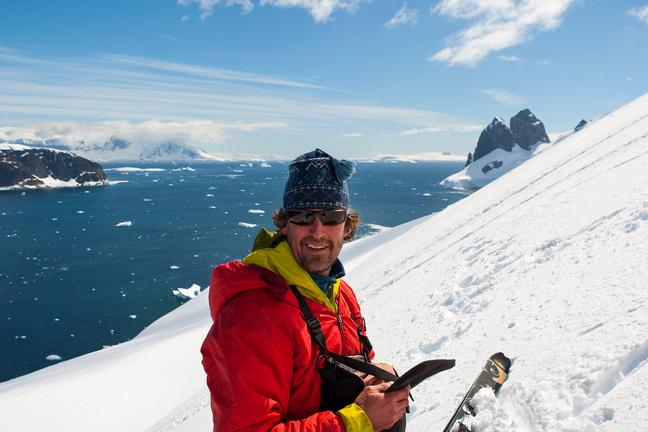
What are some life lessons you learned at TVRC?
I think one of the strongest life lessons was developing camaraderie, friendship and teamwork. I saw early on that it was an important skill set for life. And that resonates for me to this day. A lot of the work I do today is production which requires relying on people to pull you through like you would rely on your cabin mates.
Why Photography?
Photography slowly developed from my camp days. My mother gave me a Kodak Instamatic X-15, the ones that have the little flash cubes– they were rudimentary and didn’t really take great photos, but that didn’t really matter because it helped set a path of interest that I would later develop in college. I taught myself the initial art of taking outdoor photos, and I was already doing that when I was at camp. I have photos of me that are part of my archive and in my book that are from TVRC. That set me up for larger things in life from the confidence I gained to travel through the wilderness.
Talk about starting out capturing your time at camp, what images were you drawn towards?
Because I was young and didn’t have lenses or a smattering of what you really need, a lot of the photos were just me and my friends adventuring. That led to following the work of explorers that were photographing or doing incredible expeditions to the Arctic or to the highest mountain in the world, Everest. I saw those photos and thought, “Oh, I’ll just document my own adventure in Wyoming.” That slowly came into this profession later in my life. I’m still doing that work from commercials work to action sports and portraiture.
Initially it started off as documenting my adventures, but as I developed my skills, I realized, “Hey, this is how you cover a story: you need the opening photo, the tell-all story, you need your details shots, you need your lifestyle and portraits of the people you’re working with.” These moments all kind of started my career from shooting that Instamatic.
Do you have any favorite moments that you captured?
There were a couple funny ones. I always got a kick out of how cheesy the camp portraits were. One of those shots is in the book. That was one of the defining moments in my life when I realized I wasn’t probably going to school back East. That isn’t me. I am stoked to be out here– out west. I’m developing my career in something that is outdoor-related because I love the outdoors. Then I manifested that. I graduated with a degree in Recreation Management and Forestry with Business and although I worked in the private guiding realm, I found photography and switched gears and decided to pursue that as a full time job. That was a struggle– it wasn’t easy, and it’s much more challenging today than it was back then. It was being at the right place at the right time and having the skill. A lot of that came back to my early years at Teton Valley.
What advice would you give to a camper at TVRC today who finds that same spark of passion you did?
The point of life is that you have an opportunity to really experience a camp that is very unique. There are not many like this in the United States anymore where you can get a broad spectrum of skill sets in horsemanship, hiking, and mountaineering; skill sets and experiences that for a person like me changed who I was and literally set me on a course to live in the mountains of Wyoming. I had a lot of friends who were campers that went on to be successful businessmen and lawyers, and I went on to be a successful artist. In the end, we all have a path, and I’m glad I had that opportunity because it really was an iconic and defining moment of my life. Had I not done it, I might not have gone and pursued some of the things that I do now. I would reach out to them and say, “Hey, this is an opportunity for you to be a camper that can make a difference in the world because your camera is a voice and it has power.”
If you really put your mind to it you can do incredible things with photographs because even though everybody has a camera on their phone, very few people pursue it beyond that. You are at the right place. You are in one of the most beautiful areas of the world, so take that camera and use it to tell unique stories that can create change in the world ”
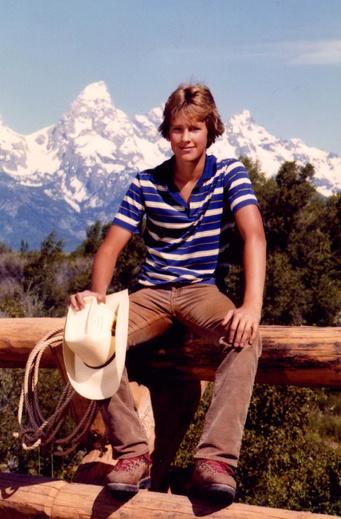
You can find Greg’s work in his new book, Angle of Repose, which is the first fine art coffee table book by legendary adventure, ski and snowboard photographer. Set entirely in Jackson Hole and the surrounding mountains, this story-driven collection features some of the finest winter sports photography ever produced by the former Senior Photographer for Powder Magazine. Accompanying the visual feast are thematic chapters describing the craft of capturing snow sports photography. World-renowned adventurer and Academy Award-winning film director, Jimmy Chin, provides the foreword. Whether you’re a black diamond skier, a novice snowboarder, or just an enthusiast of mountain scenery and photography, this book is sure to inspire readers with the beauty of skiing in Jackson Hole. In the world of snow science, the angle of repose—the angle at which solid granular material will start to tumble downhill—is used to help judge slope stability. Through his preface and accompanying chapters, Von Doersten masterfully weaves it as a metaphor for life as a skier and photographer. Angle of Repose is the ultimate bucket list item for any snow sports enthusiast. You can find his book online at https://greg-von-doersten-fine-art-store.com or see more of his work at https://www.gregvondoersten.com.
Josh Tishman, NRHA Pro
When did you first come to TVRC?
I came as a Rough Rider at 12 or 13 years old.
Talk about your time at camp: what were your favorite parts?
The barn experience and the riding and that aspect of the Ranch. I remember that I spent most of my time in or around the barn and doing that side of the activities. I loved being in the arena and doing the stuff there around the barn. The whole experience was an introduction into the western way of life.
You started riding before camp. Did riding at camp shape your trajectory towards reining?
I’ve been riding horses my whole life. I grew up on the East Coast riding English and jumping and got into the western side of horses and ranching at my parent’s ranch in Colorado. TVRC definitely showed me that I liked the western life of horses and ranching and I do a little more of the show aspect now. It really steered me away from my English background.
How did you settle on Reining?
After going to camp and getting into western-style riding, I decided to go to school and study Equine Science, and my school had a show team that the coach convinced me to be on. There were a couple of different disciplines and that is where I was introduced to reigning.
I started looking into it and fell in love with it and decided that is what I wanted to do in life. It has been great and it is a competition but it is also training and high-dollar, high-stress scenarios. Last year I qualified and showed at The Run For A Million. It is a way of life and lifestyle that I love.
What are some life lessons that you learned at TVRC?
In the industry that I’m in, it is all about a team atmosphere. I worked for a couple different people for eight years and just started my own business. In Reigning, it’s not just you, and you have to have a whole team behind you. You work with others and do it together, and those are lessons I also learned at TVRC.
What advice would you give to a camper at TVRC today who finds that same spark of passion you did?
Don’t be afraid if you are interested to dive right into it. I was a little bit of a rebel at camp because I put my foot down and went to the barn every day. I think other elements of camp are important though, too. When I was younger, I was not a fan of the idea of camp at first, but I ended up coming back for multiple years as a camper and working on staff for a year in college. Don’t be afraid to focus on the part of camp you love and are drawn to.


